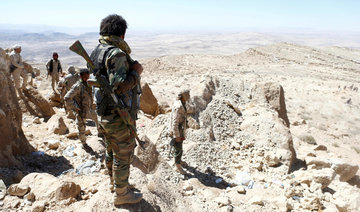DUBAI: A Yemeni mother in Houthi rebel custody is waiting to be put to death over allegations she spied for the United Arab Emirates, rights group Amnesty International said on Thursday.
A court in rebel-held capital Sanaa handed down the death penalty to 22-year-old Asmaa Al-Omeissy and two men on charges of "aiding an enemy country" after their enforced disappearance and months of torture, Amnesty said.
Yemeni activists and lawyers say they believe this is the first time a woman has been sentenced to death in a "state security" case, according to Amnesty.
Amnesty said the latest sentencing was "part of a wider pattern of the Houthis using the judiciary to settle political scores”.
The rebel-run Saba News Agency said the Specialised Criminal Court sentenced Omeissy, Saeed Al-Ruwaished and Ahmed Bawazeer to death on Jan 30.
They were found guilty of "communication and aiding the Arab alliance, which resulted in facilitating the targeting and seizure of strategic sites in Yemen.”
They were also found guilty of "establishing an espionage network and recruiting agents to work on behalf of the United Arab Emirates", Saba said.
Omeissy's 50-year-old father Matir received a 15-year prison sentence for an "indecent act" - allowing his daughter to be in the same car as the male defendants.
Asmaa, who has two children, is the only one of the three still in custody.
The men were able to pay bail and flee to parts of Yemen not controlled by the rebels, Amnesty said, accusing the Huthis of engaging in "extortion".
The UAE, for which the defendants are accused of spying, is a pillar of the Saudi-led Arab military coalition that intervened in Yemen in 2015 with the aim of rolling back rebel gains and restoring the internationally recognised government.
The Iran-backed Houthis have cracked down in Sanaa in recent months, gunning down one-time ally Ali Abdullah Saleh and cracking down on opponents.
Journalists and activists have previously been sentenced to death by Houthi-run courts on charges of spying for Saudi Arabia.
Amnesty said the defendants in the latest case were subjected to "enforced disappearance, cut off from the outside world, and secretly moved from one facility to the other.
"They were held in squalor in pre-trial detention for months, extorted for money, subjected to continuous humiliation and extreme physical abuse, and denied basic rights including legal counsel and family visits.”
Amnesty has called for the sentences to be "quashed without delay".
Houthis sentence young Yemeni mother to death for ‘spying’
Houthis sentence young Yemeni mother to death for ‘spying’













